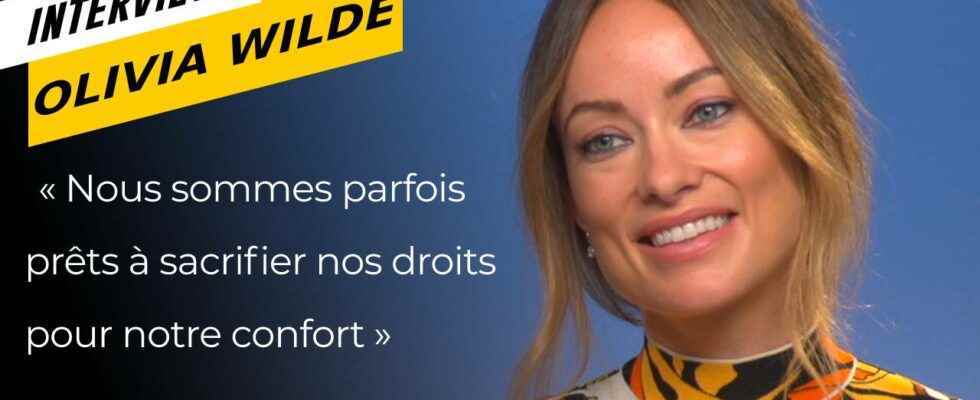After “Booksmart”, Olivia Wilde signs her second feature film as a director: “Don’t Worry Darling”. And she proves, to our microphone, that she is as interesting in her directing work as in an interview.
Olivia Wilde director: second! After Booksmart, a teen movie full of tenderness visible on Netflix, the actress goes back behind the camera and confirms all the good that we thought of her with Don’t Worry Darling. It immerses us this time in the America of the 50s, within a seemingly perfect community.
But only in appearance. Because Alice (Florence Pugh, always so intense and impressive) begins to doubt the validity of its creator (Chris Pine) and what hides this neat suburb. The opportunity for Olivia Wilde to create a disturbing and seductive atmosphere around the mysteries of her story, which she describes as a love letter to cinema. Meeting with a fascinating director, both on screen and in an interview.
AlloCiné: What did you see in the script to want to make it your second film as a director? Images, iconography? Or what the story allowed you to say about America today?
Olivia Wilde: It was all that. An opportunity to raise my game as a director, and use all the tools at my disposal to create a world. I knew this script would allow me to fully dive into the notions of cinematography, sets and costumes in an ambitious and endlessly inspiring way.
It gave me the opportunity to do something that felt cinematic to the audience. Don’t Worry Darling was done during the pandemic [le tournage a eu lieu entre octobre 2020 et février 2021, ndlr], while we wondered if the films would continue to see the light of day, if Hollywood was dead. This film seems to me to be an answer to these questions, in a way. It’s a love letter to cinema. A love letter to the cinematic experience. It was designed with this expansive cinematic experience in mind.
And, at the same time, the questions that the film seeks to ask interested me: what is the system that serves you and in which we find ourselves? Who can be brave enough to question it, even if it is very comfortable? That really interested me, this idea of whether you’re ready to step out of line, even if you’re comfortable staying in it.
We are sometimes willing to sacrifice our rights for our comfort
And that seems to be your will, as a director, to step out of line.
Absolutely ! I want to keep asking questions, be brave, bold. I want to get out of what is expected of me or what I think has already been said. I want to be provocative. Add elements to the debate. Being predictable and trying to fit into what already exists doesn’t interest me. Making a movie takes a lot of work, so if you make one, you might as well bring something new. Even if people don’t like it. It remains an opportunity to take risks, and it is stimulating.
How much did “Alice in Wonderland” and “Through the Looking Glass” influence the screenplay and direction? Beyond the characters called Alice and Bunny.
“On the other side of the mirror” was a huge influence, yes. This story of a woman who finds herself questioning her reality had several sources of inspiration, because these are questions that people have had for a long time: “What is real? How do we know it is? Are we in a dream or in reality?”
Throughout human history, philosophy has attempted to understand consciousness, and I love that Don’t Worry Darling is a tribute to all those stories that have sought to question the notion of reality and what we want to do within it.
Warner Bros. France Olivia Wilde and Florence Pugh in “Don’t Worry Darling”
How was the iconography of the 50s and 60s conducive to the atmosphere you create, bordering on horror?
I find it both incredibly seductive and very problematic at the same time. Because it’s a very restrictive time for women, people of color, gays… Anyone who wasn’t straight white men. But we are still drawn to its iconography, because of the films of this period, its music and its fashion. It’s very seductive and, undeniably, sublime. But the nostalgia for that time is problematic, because it plunges us back into something inherently imperfect.
But it fascinated me, and I wondered why I wanted to belong to an era that wouldn’t serve me in any way. Why I would drink Martinis with Frank Sinatra and hang out in Palm Springs, by the pool, knowing that it would be a much more difficult and demanding time for me as a woman. Because we are sometimes ready to sacrifice our rights for our comfort, and I find this ambivalence interesting.
Being predictable and trying to fit into what already exists doesn’t interest me
Did filming during the pandemic help create this somewhat timeless vibe on set?
It especially helped to create the intensity that we feel in the film. There is an energy that stems from the common emotional intensity that we felt at the time. The dynamic on set was very unusual, as everyone was in a bubble, to protect each other. We were much more tight-knit than on a normal production and, like everyone else, we felt isolated from society. But we were able to come together, suddenly, with the common goal of telling this story. It was strange, to be together to make a film, but I think it comes across in the story.
Interview by Maximilien Pierrette in Paris on September 17, 2022
